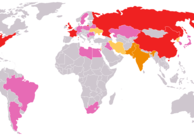From JournalQuestCornell International Affairs Review - 2011 VOL. 4 NO. 2Journal Archives
JournalQuest is a free program to help academic student publications increase online readership and distribution. If you are interested in enrolling a journal at your school, please visit the JournalQuest website. To embed this issue on your website, insert the following code into the page where you want the issue to show up:
<script id="spjq_latest" type="text/javascript" src="http://www.inquiriesjournal.com/widgets/jq-latest.js" data-jid="14" data-issue="60" ></script>
<div id="spjq-latest"></div> |









